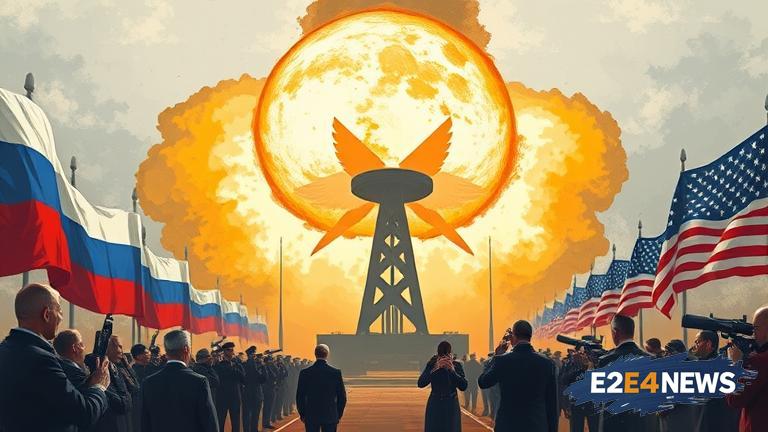The Intermediate-Range Nuclear Forces Treaty, a landmark agreement between the US and Russia, has been terminated by Russia, sparking a significant escalation in nuclear tensions between the two nations. This move comes just days before the deadline set by President Trump, who had threatened to withdraw from the treaty if Russia did not comply with its terms. The treaty, signed in 1987, banned the development and deployment of ground-launched missiles with ranges between 500 and 5,500 kilometers. Russia’s decision to withdraw from the treaty has been met with concern from European leaders, who fear the consequences of a renewed nuclear arms race. The US has accused Russia of violating the treaty by developing and deploying a new cruise missile, which Russia has denied. The collapse of the treaty has significant implications for global security, as it removes a key constraint on the development and deployment of nuclear missiles. The US and Russia have been engaged in a war of words over the treaty, with each side accusing the other of violating its terms. The US has also been critical of Russia’s actions in Ukraine and its alleged meddling in the 2016 US presidential election. Russia, on the other hand, has accused the US of attempting to undermine its national security and of developing new nuclear capabilities. The termination of the treaty has sparked a heated debate over the future of nuclear arms control, with some arguing that it is essential to prevent a nuclear arms race and others arguing that it is necessary to counter the growing threat from Russia and China. The US has announced plans to develop new nuclear capabilities, including a new ground-launched missile, which has been criticized by Russia and China. The European Union has called for calm and restraint, urging both sides to engage in diplomatic efforts to resolve their differences. The collapse of the treaty has also raised concerns about the potential for a nuclear accident or miscalculation, which could have catastrophic consequences. The US and Russia have a long history of nuclear rivalry, dating back to the Cold War, and the termination of the treaty has raised fears of a new era of nuclear competition. The international community is watching the situation closely, with many calling for a return to diplomatic efforts to resolve the crisis. The US and Russia must now navigate a new and uncertain landscape, with the risk of nuclear conflict higher than it has been in decades. The termination of the treaty is a significant blow to global security and stability, and it remains to be seen how the situation will unfold in the coming weeks and months. The US and Russia must work together to find a way out of this crisis, and to prevent a nuclear arms race that could have devastating consequences for the world. The clock is ticking, and the international community is holding its breath as it waits to see what will happen next. The situation is complex and multifaceted, with many different factors at play, and it will require careful diplomacy and statesmanship to resolve. The US and Russia have a responsibility to the international community to find a way out of this crisis, and to prevent a nuclear conflict that could have catastrophic consequences. The world is watching, and the stakes are high, as the US and Russia navigate this critical moment in their relationship. The future of global security and stability hangs in the balance, and it remains to be seen how the situation will unfold. The US and Russia must work together to find a way out of this crisis, and to prevent a nuclear arms race that could have devastating consequences for the world.





